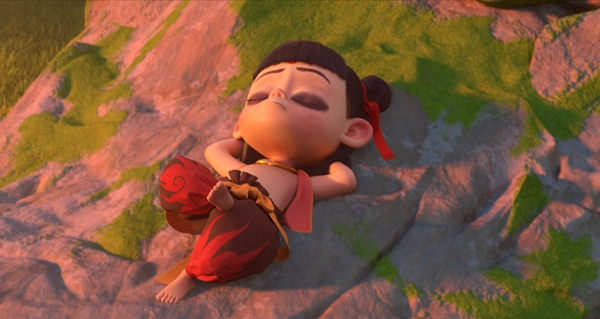Unexpected success of 'Ne Zha' inspires director to next project
 0 Comment(s)
0 Comment(s) Print
Print E-mail China Daily, August 8, 2019
E-mail China Daily, August 8, 2019

After a road show across 16 cities over 23 days, the director of animation films, Yang Yu, known better by his online nickname Jiaozi, has returned to Chengdu, Sichuan province, where he lives.
Thanks to Ne Zha, the phenomenal hit that has hopped past Disney's Zootopia to become the all-time highest-grossing animation film in China, Yang has risen to fame overnight.
As of Wednesday, Ne Zha had seen a box-office haul upward of 2.8 billion yuan ($398 million) and dominated around 37 percent of the country's 65,000 or so cinema screens. Going by its current momentum, Maoyan, a box-office tracker and app, has estimated the film will finally touch 4.68 billion yuan.
"I'm not planning any special celebrations," says Yang, who was born in 1980.
But the film's unexpected success is pushing him to improve his next movie, he adds. He will stay at home to focus on a new script.
Ne Zha, a subversive retelling of the title role's story from the Ming Dynasty (1368-1644) novel Fengshen Yanyi (The Investiture of the Gods), marks his third film and first directorial feature. The film has struck a chord with many viewers because the protagonist is depicted as an unlikely hero who fights his destiny.
Yang, who has himself struggled for more than a decade in his career, is somewhat of a real-life model for the main role in the film. A native of Luzhou city in Sichuan, Yang was born in a doctors' family. As his parents thought a hospital job would be stable, Yang enrolled into a pharmacy major at Huaxi Medical College, now affiliated to Sichuan University.
But his fascination for animation, sparked by a recommendation from a fellow student when Yang was in third year at the medical college, changed his life. When most of his classmates chose to work as doctors after graduation, Yang stayed at home for three and a half years to make a short animation film, surviving on his mother's monthly pension of about 1,000 yuan.
Yang recalls that period was like "living in a space station", as his routine activities were limited in their small family apartment.
A turning point came in 2009, when Yang's directorial debut, the 16-minute work, See Through, quickly earned recognition after it was released. Aside from online praise, exemplified by a score of 8.7 points out of 10 on Douban, the country's most popular review aggregator, the film got more than 30 awards in China and outside.
The success prompted him to establish an animation studio in Chengdu, Sichuan's provincial capital, but in the following six years, Yang struggled to get investors on board to finance a feature-length animation film. In 2014, Coloroom Pictures, a subsidiary of Beijing-based studio Enlight Media, reached out to him with finance for a film on the mythological figure Ne Zha.
Hiring around 1,600 members from over 20 animation companies, the film took five years for production, with emphasis on Ne Zha's new screen image-a boy with crooked teeth and dark circles around his eyes. It was a big change because over the past 40 years, Ne Zha had been played by handsome actors in TV dramas, movies and animation works, following the novel's original depiction.
"It would have been easy for our animators to paint a handsome face that the audience will like at first glance. But we wanted a breakthrough and wished to convey a message that a person should not be judged by his or her look. Instead, it's the internal personality that decides who you are," Yang explains.
Now with foreign netizens expressing their wish to watch the film, its overseas distribution, which is expected to have English subtitles, is also in negotiation.
"The film mainly targeted domestic audiences when we decided to make it," says Yang.
But he adds that he believes the movie, despite being set in ancient China and studded with Chinese culture and history, will not be difficult for foreign viewers to watch as the characters' feelings are universal.
An extra scene released with the film Ne Zha that shows Jiang Ziya, another key figure in the ancient novel Fengshen Yanyi, has also stirred debate online. Some Chinese netizens say they hope that the success of Ne Zha ushers in a new franchise inspired by Fengshen Yanyi, evolving as a Chinese answer to the world's most lucrative superhero series, Marvel Cinematic Universe.
Speaking about the internet frenzy, dubbed the fengshen yuzhou ("Fengshen cinematic universe"), Yang gives a guarded reaction.
"It's too early to expect Chinese animators to create such a cinematic universe, as we have yet to gain that kind of competence.
"To make good animation, you need to endure loneliness and not compromise."






Go to Forum >>0 Comment(s)